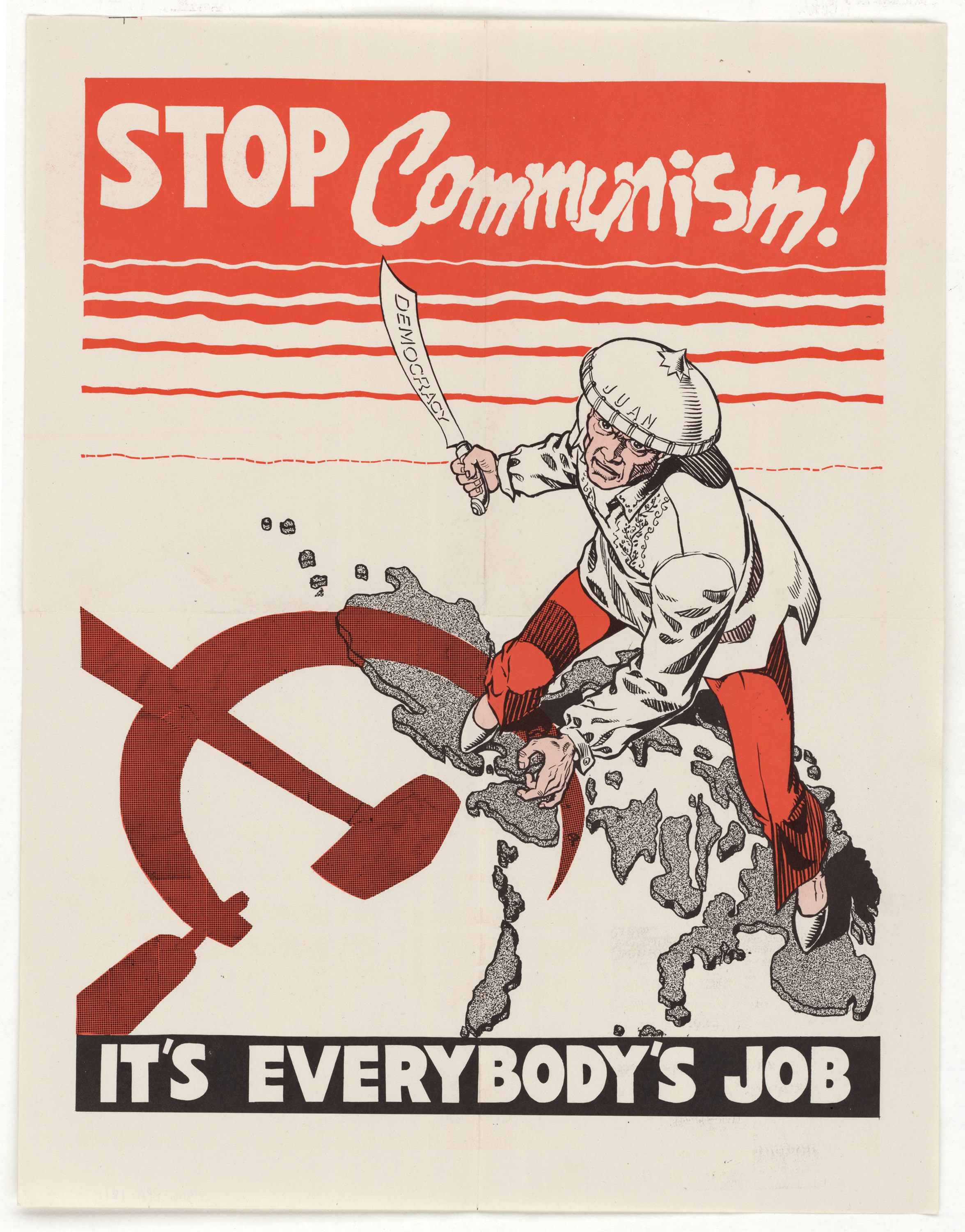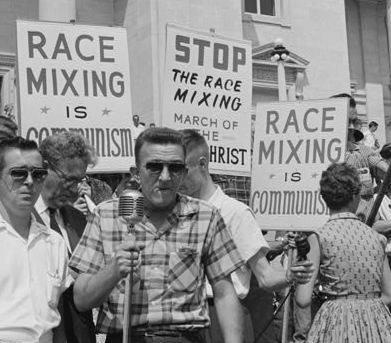No edit summary Tag: Visual edit |
No edit summary Tag: Visual edit |
||
| Line 1: | Line 1: | ||
[[File:Stop Communism propaganda poster.jpg|thumb|255x255px|Anti-communist propaganda poster from the 1950's depicting the "sword of democracy" fighting against a hammer and sickle in the Philippines]]'''Anti-communism''' is a [[reactionary]] political ideology which opposes [[communism]], usually promoted by [[capitalism|capitalist]] propagandists who recognize communism as a threat to their power. | [[File:Stop Communism propaganda poster.jpg|thumb|255x255px|Anti-communist propaganda poster from the 1950's depicting the "sword of democracy" fighting against a hammer and sickle in the [[Republic of the Philippines|Philippines]]]]'''Anti-communism''' is a [[reactionary]] political ideology which opposes [[communism]], usually promoted by [[capitalism|capitalist]] propagandists who recognize communism as a threat to their power. | ||
While organized anti-communism emerged in response to the [[October Revolution|Russian Revolution]] of 1917, bourgeois repression of working class movements was already enforced before that, notably in the repression against the [[Paris Commune]].<ref name=":0">{{Textcite|author=Fabio Giovannini|year=2004|title=Breve storia dell'anticomunismo|pdf=|city=Roma|publisher=Datanews Editrice|isbn=9788879812511|lg=http://libgen.rs/book/index.php?md5=6B0C93DFC9C70FADA5C6D9F07B3C3FA2|trans=Brief history of anti-communism|translang=Italian}}</ref> | While organized anti-communism emerged in response to the [[October Revolution|Russian Revolution]] of 1917, [[Bourgeoisie|bourgeois]] repression of [[Proletariat|working class]] movements was already enforced before that, notably in the repression against the [[Paris Commune]].<ref name=":0">{{Textcite|author=Fabio Giovannini|year=2004|title=Breve storia dell'anticomunismo|pdf=|city=Roma|publisher=Datanews Editrice|isbn=9788879812511|lg=http://libgen.rs/book/index.php?md5=6B0C93DFC9C70FADA5C6D9F07B3C3FA2|trans=Brief history of anti-communism|translang=Italian}}</ref> | ||
In the first paragraph of his 1848 ''[[Manifesto of the communist party]]'', [[Karl Marx]] references anti-communism already existent in his time: ''“All the powers of old Europe have entered into a holy alliance to exorcise [the spectre of communism]: [[Giovanni Ferretti|Pope]] and [[Nikolai Pavlovich Romanov|Tsar]], [[Klemens von Metternich|Metternich]] and [[François Guizot|Guizot]], French Radicals and German police-spies.”''<ref>Karl Marx. ''Manifesto of the communist party.'' [[Library:Manifesto of the communist party|Library link]]</ref> | In the first paragraph of his 1848 ''[[Manifesto of the communist party]]'', [[Karl Marx]] references anti-communism already existent in his time: ''“All the powers of old Europe have entered into a holy alliance to exorcise [the spectre of communism]: [[Giovanni Ferretti|Pope]] and [[Nikolai Pavlovich Romanov|Tsar]], [[Klemens von Metternich|Metternich]] and [[François Guizot|Guizot]], French Radicals and German police-spies.”''<ref>Karl Marx. ''Manifesto of the communist party.'' [[Library:Manifesto of the communist party|Library link]]</ref> | ||
Anti-communists frequently blame failures on capitalism on [[Xenophobia|immigrants]], [[Racism|Black people]], or [[Antisemitism|Jews]] instead of on the [[exploitation]] and chaos inherent in the capitalist [[mode of production]].<ref>{{Web citation|author=Jodi Dean|newspaper=[[Liberation School]]|title=Whose lessons? Which direction?|date=2022-12-19|url=https://www.liberationschool.org/whose-lessons-which-direction/|archive-url=https://web.archive.org/web/20221219174918/https://www.liberationschool.org/whose-lessons-which-direction/|archive-date=2022-12-19|retrieved=2022-12-23}}</ref> | |||
==History== | ==History== | ||
Revision as of 12:51, 23 December 2022

Anti-communism is a reactionary political ideology which opposes communism, usually promoted by capitalist propagandists who recognize communism as a threat to their power.
While organized anti-communism emerged in response to the Russian Revolution of 1917, bourgeois repression of working class movements was already enforced before that, notably in the repression against the Paris Commune.[1]
In the first paragraph of his 1848 Manifesto of the communist party, Karl Marx references anti-communism already existent in his time: “All the powers of old Europe have entered into a holy alliance to exorcise [the spectre of communism]: Pope and Tsar, Metternich and Guizot, French Radicals and German police-spies.”[2]
Anti-communists frequently blame failures on capitalism on immigrants, Black people, or Jews instead of on the exploitation and chaos inherent in the capitalist mode of production.[3]
History
Origins of anti-communism
Bourgeois repression of communism can be traced as early as 1796,[1] when the newly installed French bourgeois government ordered the arrest and execution of the utopian socialist François-Noël Babeuf, in a crackdown against the "Conspiracy of the Equals", a group of Jacobin revolutionaries who advocated for the abolition of private property.
Auguste Blanqui, another utopian socialist, was frequently persecuted and arrested during his lifetime.[1]
Reaction to October Revolution
Anti-communism in the United States


The history of the white supremacist movement in the United States is the history of anti-communism. [4]
References
- ↑ 1.0 1.1 1.2 Fabio Giovannini (2004). Brief history of anti-communism [Italian: Breve storia dell'anticomunismo]. Roma: Datanews Editrice. ISBN 9788879812511 [LG]
- ↑ Karl Marx. Manifesto of the communist party. Library link
- ↑ Jodi Dean (2022-12-19). "Whose lessons? Which direction?" Liberation School. Archived from the original on 2022-12-19. Retrieved 2022-12-23.
- ↑ Lz. A., Edited by Roderic Day, Nia Frome (2004). A Brief History of American Vigilantism.